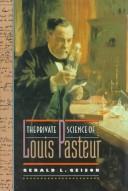| Listing 1 - 2 of 2 |
Sort by
|
Book
ISBN: 9782760620513 2760620514 Year: 2011 Publisher: Montréal: Presses de l'Université de Montréal,
Abstract | Keywords | Export | Availability | Bookmark
 Loading...
Loading...Choose an application
- Reference Manager
- EndNote
- RefWorks (Direct export to RefWorks)
1. L'essai clinique contrôlé moderne - 2. La médecine des preuves aux Etats-Unis - 3. La médecine des preuves en Angleterre - 4. Un bilan des essais cliniques contrôlés - Cadre public ou cadre privé? - Conclusion - Bibliographie
Evidence-Based Medicine --- Clinical Trials as Topic --- Cross-Over Studies --- History of Medicine --- Therapeutic Human Experimentation --- history --- Études croisées --- Études cliniques --- Médecine factuelle. --- Thérapeutique expérimentale --- Crossover trials --- Clinical trials --- Evidence-based medicine. --- Therapeutics, Experimental --- Médecine basée sur les preuves --- Histoire. --- History. --- Études cliniques. --- Médecine basée sur les preuves. --- Wetenschappelijke verenigingen : Centrum voor Evidence Based Medicine --- Associations scientifiques : Centre d'evidence based medicine --- Clinical Trials as Topic - history --- Cross-Over Studies - history --- Therapeutic Human Experimentation - history --- Randomized Controlled Trials as Topic --- Études croisées --- Études cliniques --- Médecine factuelle. --- Thérapeutique expérimentale --- Études cliniques. --- Médecine basée sur les preuves.

ISBN: 0691034427 1306984459 0691604975 0691633975 069101552X 1400864089 9781400864089 9780691034423 9780691604978 9780691633978 9780691015521 Year: 1995 Publisher: Princeton, New Jersey : Princeton University Press,
Abstract | Keywords | Export | Availability | Bookmark
 Loading...
Loading...Choose an application
- Reference Manager
- EndNote
- RefWorks (Direct export to RefWorks)
In The Private Science of Louis Pasteur, Gerald Geison has written a controversial biography that finally penetrates the secrecy that has surrounded much of this legendary scientist's laboratory work. Geison uses Pasteur's laboratory notebooks, made available only recently, and his published papers to present a rich and full account of some of the most famous episodes in the history of science and their darker sides--for example, Pasteur's rush to develop the rabies vaccine and the human risks his haste entailed. The discrepancies between the public record and the "private science" of Louis Pasteur tell us as much about the man as they do about the highly competitive and political world he learned to master. Although experimental ingenuity served Pasteur well, he also owed much of his success to the polemical virtuosity and political savvy that won him unprecedented financial support from the French state during the late nineteenth century. But a close look at his greatest achievements raises ethical issues. In the case of Pasteur's widely publicized anthrax vaccine, Geison reveals its initial defects and how Pasteur, in order to avoid embarrassment, secretly incorporated a rival colleague's findings to make his version of the vaccine work. Pasteur's premature decision to apply his rabies treatment to his first animal-bite victims raises even deeper questions and must be understood not only in terms of the ethics of human experimentation and scientific method, but also in light of Pasteur's shift from a biological theory of immunity to a chemical theory--similar to ones he had often disparaged when advanced by his competitors. Through his vivid reconstruction of the professional rivalries as well as the national adulation that surrounded Pasteur, Geison places him in his wider cultural context. In giving Pasteur the close scrutiny his fame and achievements deserve, Geison's book offers compelling reading for anyone interested in the social and ethical dimensions of science. Originally published in 1995.The Princeton Legacy Library uses the latest print-on-demand technology to again make available previously out-of-print books from the distinguished backlist of Princeton University Press. These editions preserve the original texts of these important books while presenting them in durable paperback and hardcover editions. The goal of the Princeton Legacy Library is to vastly increase access to the rich scholarly heritage found in the thousands of books published by Princeton University Press since its founding in 1905.
Rhabdoviridae Infections --- Primary Prevention --- Biography as Topic --- -Disease Attributes --- Animal Experimentation --- Retrospective Moral Judgment --- Immunization --- Therapeutic Human Experimentation --- Animal Welfare --- Famous Persons --- Terminally Ill --- Research Personnel --- Iatrogenic Disease --- Research Subjects --- Rabies --- Pasteur, Louis, --- Paster, Lui, --- Pa-xtʼ, Lu-i, --- Pasteur, --- פסטר, לואי --- Pasteur, L. --- Pasteur, Luis, --- Scientists --- Biography. --- Biographies. --- Medical atlases, portraits, iconography. --- Medical research incl. research institutes, foundations. --- Scientifiques --- Biography --- Biographies --- France --- Pasteur, Louis, - 1822-1895. --- Scientists - France - Biography. --- Pasteur, louis (1822-1895) --- Chercheurs scientifiques --- Biographie
| Listing 1 - 2 of 2 |
Sort by
|

 Search
Search Feedback
Feedback About UniCat
About UniCat  Help
Help News
News